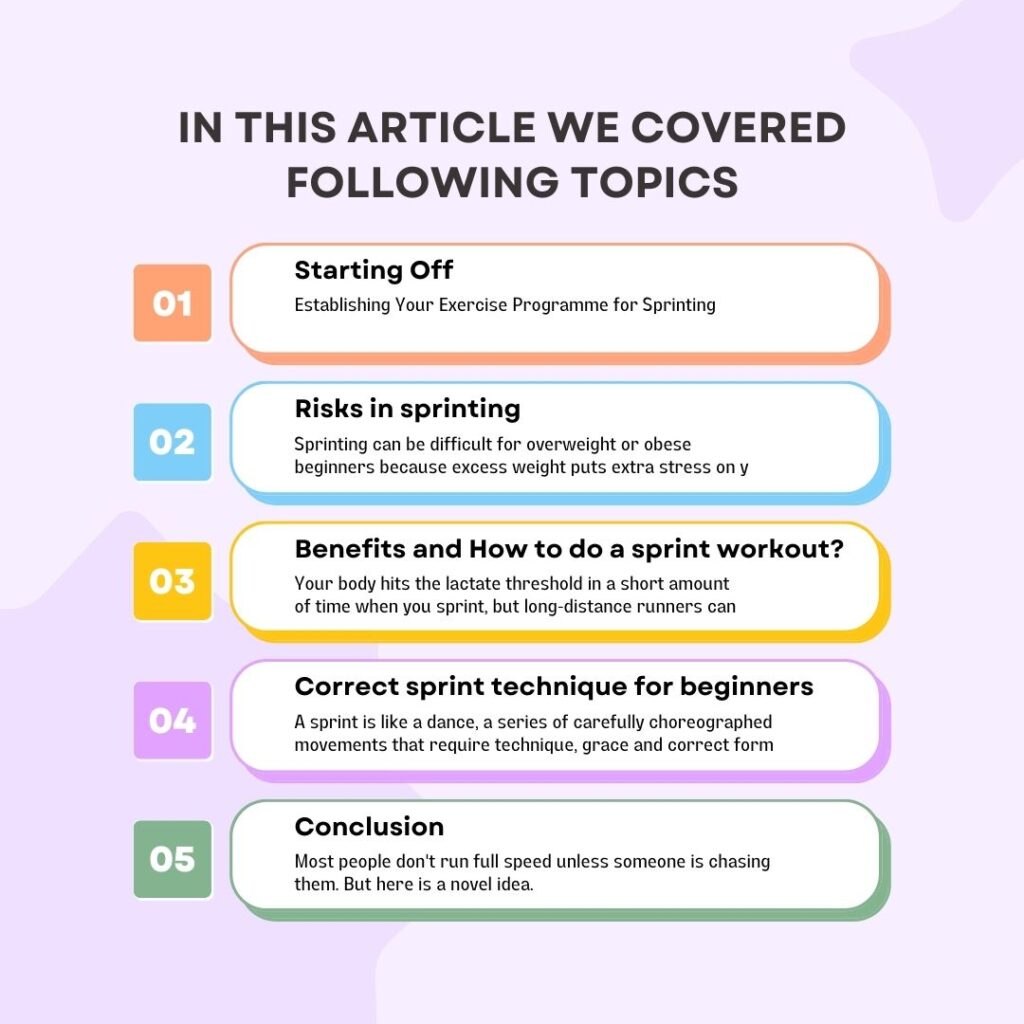A sprint workout combines short sprints with a recovery period to allow your body to generate enough oxygen to remove lactic acid before a new sprint interval begins.
However, starting a sprint training program can be intimidating for those who have never tried it before. It’s like signing up for an advanced physics course if you haven’t brushed up on the basics in a while.
After you’ve heated up and extended and have the appropriate equipment, it’s time to concentrate on technique. Exercises involving sprinting are primarily about speed and force, so form is crucial.
Sprint workout intervals are an excellent method of improving speed. Begin with a brisk warm-up jog, then accelerate for ten to twenty seconds, then reduce your speed and jog for one or two minutes. Continue in this manner for ten minutes.

“A further strategy to concentrate on is speed practice. The goal of speed exercises is to challenge yourself and improve your form and speed. Begin with a jog to warm up, then, after 30 to 60 seconds, bump up the speed”.
After concentrating on your form, take a few minutes to slow down as well as jog. Continue in this manner for 20 times and do a sprint workout.
Starting: Establishing Your Exercise Program for Sprinting
The next stage is to begin a sprint workout after being aware of the possible risks.
Ensure you are wearing appropriate shoes first. It’s crucial to wear supportive, well-cushioned running shoes.
It would be ideal to perform a few exercises to warm up the muscles in your body. Get your muscles going before you begin a sprint workout because exercising your body cold can result in harm.
- As you get more comfortable, start slowly and progressively pick up the pace.
- Lastly, ensure that you have a predetermined path so you can monitor your progress and gauge how far you’ve come.
- With the right equipment, a suitable warm-up, and a predetermined route, you can sprint.
Risks in sprinting
Sprinting can be difficult for overweight or obese beginners because excess weight puts extra stress on your joints and can increase your risk of injury.
Just like driving a high-performance sports car requires skill and attention, sprinting requires proper form and attention to avoid injury. Do you want to know how to do a sprint workout? Let’s see
Warmup
- Practice quick footwork with butt kicks, heel lifts, high knees, and ankle movements.
- Don’t forget to work your calves with heel raises and improve your coordination with A and B jumps. A warmup is a must before knowing how to do a sprint workout.
- If you’re feeling brave, add jumping lunges and back runs to set the mood.
- Once you’ve warmed up and are flexible, it’s time to start sprint training.
- Start with short strides and let him run 40, 50, or 60 meters at 80% of his maximum effort, with 90 seconds of recovery time between each bout.
- Focus on correct form and maximum speed to get the most out of your workout.
- After completing the set, use the completion routine to complete the set. Repeat this cycle 8–10 times to push yourself and get results.
Benefits and How to do a Sprint Workout?
Your body hits the lactate threshold in a short amount of time when you sprint, but long-distance runners can hit the lactate threshold as well.
Incorporating sprinting exercises into your workout will prepare your body to adapt to the lactic acid surge, pushing your threshold and allowing you to run longer or faster before reaching it.
A higher VO2max means more oxygen and a greater ability to remove lactate. This means that it will take longer to reach the lactate threshold.
It also means you have more energy to run because your muscles need oxygen to turn glucose into fuel. Sprinting has also been shown to build leg muscle and strength when paired with a proper diet.
But instead of relying solely on sprints to build muscle, include strength training as well. These are the benefits of a sprint workout.
- This is when you do warm-up runs and dynamic stretching before starting sprint training.
- Just perform flat sprint exercises by running for 30 seconds at a time.
- Rest for 2–5 minutes between sprints and increase the intensity over time.
- Perform hill sprint drills by sprinting down a hill at 50–70% intensity.
- Gradually increase the intensity while continuing.
- Take a slow walk or jog for 5 minutes to help your body cool down after a sprint workout.
Correct sprint technique for beginners
A sprint is like a dance, a series of carefully choreographed movements that require technique, grace, and correct form. If you don’t wear the right form, you could trip on the dance floor or, worse, get hurt. How do I do a sprint workout? You must be aware of the technique first.
- Think of your shoulders as a pair of wings ready for flight. Relax, and don’t shrug your shoulders.
- Keeping bent at a 90-degree angle, pump backwards in an open arch behind your body.
- In conjunction with the leg, move the leg vigorously backwards and propel it backwards to create forward propulsion.
- Feet focus on toes apart like a rocket.
Trying to take short, quick strides instead of long strides will generate more power and keep you from going over your steps. Keep remembering how to do a sprint workout. In a good way.
Don’t hold on to tension and waste your energy. Instead, stay cool, like a lazy Sunday afternoon.
Flat sprint
Find a flat surface to walk on. Track running is the most popular place for sprint training or workouts because it’s easy to see exactly how far you’re running. After all, the distance is marked on the ground by lines.
The surface is also shock-absorbing, which helps keep joints healthy and prevents injuries. A flat sprint is one of the best ways to do a sprint workout.
“Consider running on a football field, a soccer field, or any relatively flat or long stretch of grass. Depending on the length and usage patterns, there may be parking lots or other paved areas nearby that are relatively flat and suitable for sprint workouts”.
Look for areas that are at least 40 meters long. Asphalt isn’t ideal for running, but many people run marathons on the road, so doing a few sprint workouts is certainly a better option.
Jog 1-2 laps around the track.
If you train outside the track and field, try jogging for 2-4 minutes to warm up. Do dynamic stretching exercises.
Performing a limited amount of dynamic stretching before a sprint workout has been shown to improve sprint times and prevent physical injuries.
“Dynamic stretching is stretching that you do while walking. Dynamic stretching requires more effort and is, therefore, more tiring than the gentle stretching exercises most people are used to”.
That way, you won’t have time to sprint. Here are some stretches you can try.
- Gluteus maximus: walking with knees elevated.
- Hamstrings: “Toy Soldiers” or “Frankenstein”.
- Quadriceps: “Butt Kicker”
- Gastrocnemius: Walk on tiptoes.
- Start with a 30-second sprint.
If you don’t have proper timing equipment, try sprinting about 200 meters. If you aren’t sprinting on the track and can’t measure your distance accurately, count your steps and aim for a value of 120–130 meters.
It’s not exactly 200 meters or 30 seconds, but it’s pretty close. Do your first sprint at about 70% intensity, then increase.
Don’t overdo it with all your might from the beginning.
Hill sprint
Find a good hill for training.
A good-running hill should be fairly steep and at least 40 meters long. The hill sprint workout is the best answer to how to do a sprint workout.
Depending on which hill you choose, you may need to consider traffic flow, whether there are sidewalks or berms (if running on a roadway), lighting, foliage, and the general safety of the area you are running in.
- Warm up by jogging. Jog for 2-4 minutes on a flat surface near a hill.
- Do dynamic stretches on a flat surface.
- Even when a sprint workout is done on a downhill slope, stretch on level ground so as not to overdo it. Dynamic stretching exercises are performed while walking.
- You can prevent injuries by doing a limited number of workouts before you start sprint training. Try to stretch for 5–10 minutes before doing hill sprints.
Stretches that are particularly well suited for this type of training include high knees, butt kicks, and toy soldiers.
Stretch until you feel refreshed and tired.
Do your first sprint at 50–70% intensity.
You can increase it every sprint, but only by about 10%. Take breaks in between sprints.
when going down hills
Going downhill gives your body time to recover between sprint workouts. Steep slopes require shorter strides and vice versa.
Don’t stare at the floor! Keep your chin at normal height and look straight ahead. You must be aware of the risks as well as How to do a sprint workout.
Keep your torso upright so that the toes are directly under your chest.
Do not slouch while running. Mountain sprints require a lot of fitness but are also very demanding.
If you can’t maintain proper form, you should stop to avoid injury or overuse.
Read also:-
- Breaking the Cycle: How does exercise help with depression?
- How To Get Rid Of Sciatica Permanently Doesn’t Have To Be Hard. Read These 5 Tips
- The Best Morning Walk Tips for Weight Loss
Conclusion
Most people don’t run full speed unless someone is chasing them. But here is a novel idea. “Practice running faster makes you faster,” says Matt Nolan, RRCA-certified running coach and master trainer at Bally’s Boot Camp in New York, NY. Now you got to know How to do a sprint workout.
His workout—a short, hard effort followed by a light recovery period—helps him become a better runner at any speed or distance. Stretching plus interval training are good ways to stretch up the tissues and raise your heart pulse before sprinting.
It will assist you in making the best possible use of your sprints! In the end, running is an excellent technique to raise your heart rate and enhance your general level of fitness.
“It’s an activity that will help you for years to come if you prepare properly, use good form, and take a few safety measures. So go for it, hit the path, and run your way to better health! You’ll shortly be running laps around your former self if you put in some effort”.
FAQS
How sprint workout benefits?
Incorporating sprinting exercises into your workout will prepare your body to adapt to the lactic acid surge, pushing your threshold and allowing you to run longer or faster before reaching it.
Sprint workout can be done by obese individuals?
Sprinting can be difficult for overweight or obese beginners because excess weight puts extra stress on your joints and can increase your risk of injury.
What one thing you should keep in mind?
Ensure you are wearing appropriate shoes first. It’s crucial to wear supportive, well-cushioned running shoes.
Mover’s Odyssey










